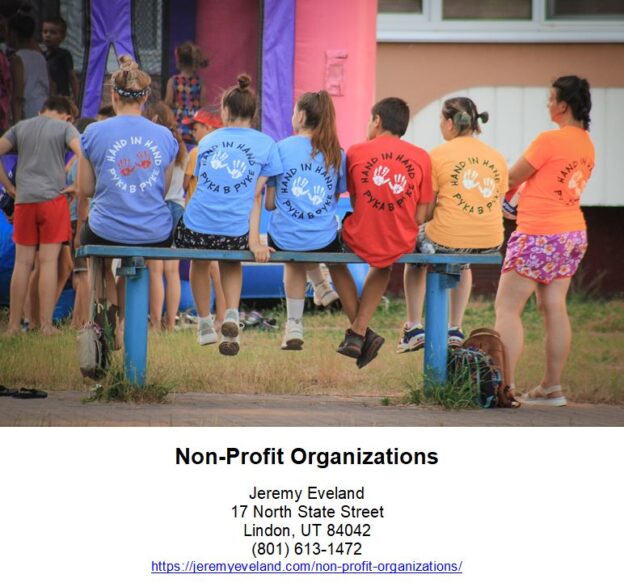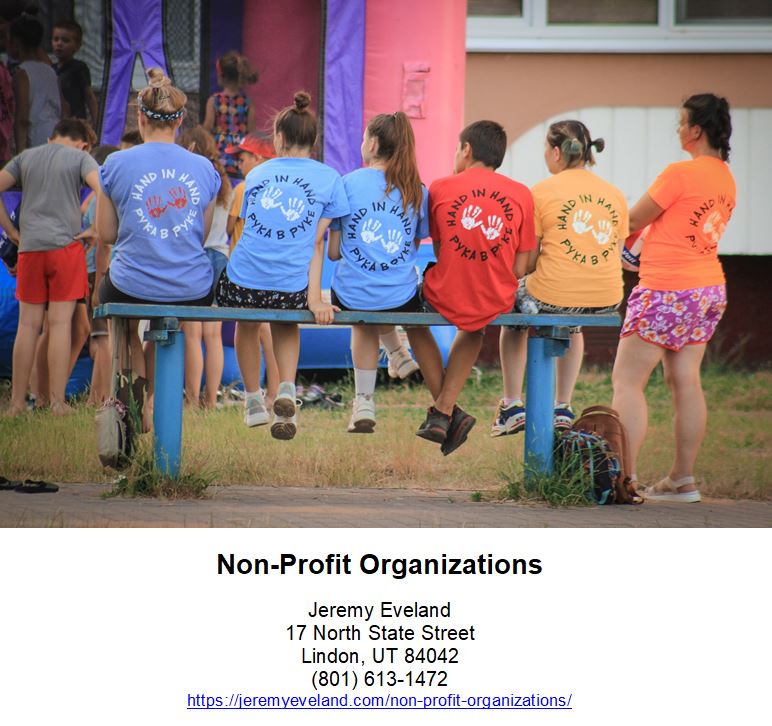-
Lawyer for Non-Profit Organizations
- Introduction
- Supporting Non-Profit Organizations in Utah
- Grants and Funding Opportunities for Non-Profit Organizations in Utah
- The George S. and Dolores Doré Eccles Foundation: Supporting Non-Profit Organizations in Utah
- How Non-Profit Organizations are Supporting Communities in Salt Lake City and Provo
- Exploring the Impact of Non-Profit Organizations in Utah
- How to Set UP A Non-Profit Organization in Utah
- Why You Need A Business Lawyer to Assist You With a Non-Profit Organization
- Q&A
“Making a Difference, One Cause at a Time”
Introduction
Non-profit organizations are entities that are dedicated to providing services and programs to benefit the public good. They are typically funded by donations, grants, and other forms of philanthropy. Non-profit organizations are often focused on providing services to those in need, such as the homeless, the elderly, and the disabled. They may also provide educational programs, health care services, and other social services. Non-profit organizations are an important part of our society, as they provide essential services to those who may not otherwise have access to them.
Supporting Non-Profit Organizations in Utah
Utah is home to many non-profit organizations that are dedicated to helping those in need. These organizations provide a variety of services, from providing food and shelter to offering educational and employment opportunities. Non-profit organizations in Utah are essential to the health and well-being of the state’s citizens.
Non-profit organizations in Utah provide a variety of services to those in need. These services include providing food, shelter, clothing, and other basic necessities. Non-profits also offer educational and employment opportunities, as well as access to health care and other social services. Non-profits also provide support to those who are struggling with addiction, mental health issues, and other challenges.
Non-profit organizations in Utah rely on donations from individuals, businesses, and other organizations to fund their operations. Donations can be made in the form of cash, goods, or services. Donations can also be made through volunteer work or by participating in fundraising events.
Non-profit organizations in Utah also rely on grants from government agencies and private foundations. Grants are typically awarded to organizations that demonstrate a commitment to helping those in need and that have a track record of success.
Non-profit organizations in Utah are essential to the health and well-being of the state’s citizens. They provide essential services to those in need and help to create a more equitable and just society. By supporting non-profit organizations in Utah, individuals, businesses, and other organizations can help to ensure that everyone in the state has access to the resources they need to lead healthy and productive lives.
Grants and Funding Opportunities for Non-Profit Organizations in Utah
Utah is home to many non-profit organizations that provide vital services to the community. These organizations rely on grants and other forms of funding to support their operations and programs. Fortunately, there are a variety of grants and funding opportunities available to non-profit organizations in Utah.
The Utah Nonprofits Association (UNA) is a great resource for non-profit organizations in Utah. UNA offers a variety of grants and funding opportunities, including the Nonprofit Capacity Building Grant Program, which provides grants of up to $5,000 to help non-profits build their capacity and sustainability. UNA also offers the Nonprofit Innovation Grant Program, which provides grants of up to $10,000 to help non-profits develop innovative programs and services.
The Utah Department of Workforce Services (DWS) also offers grants and funding opportunities for non-profit organizations in Utah. The DWS Community Services Block Grant (CSBG) provides funding to non-profits that provide services to low-income individuals and families. The DWS also offers the Community Services Program, which provides funding to non-profits that provide services to individuals with disabilities.
The Utah State Legislature also provides grants and funding opportunities for non-profit organizations in Utah. The Legislature offers the Community Impact Board Grant Program, which provides grants of up to $50,000 to non-profits that provide services to underserved populations. The Legislature also offers the Community Development Block Grant Program, which provides grants of up to $500,000 to non-profits that provide services to low-income individuals and families.
The United Way of Salt Lake also offers grants and funding opportunities for non-profit organizations in Utah. The United Way of Salt Lake offers the Community Impact Grant Program, which provides grants of up to $25,000 to non-profits that provide services to underserved populations. The United Way of Salt Lake also offers the Community Investment Grant Program, which provides grants of up to $50,000 to non-profits that provide services to low-income individuals and families.
In addition to these grants and funding opportunities, there are many other sources of funding available to non-profit organizations in Utah. Non-profits should explore all available options to ensure they are able to secure the funding they need to support their operations and programs.
The George S. and Dolores Doré Eccles Foundation: Supporting Non-Profit Organizations in Utah
The George S. and Dolores Doré Eccles Foundation is a private family foundation dedicated to improving the quality of life in Utah. Established in 1982, the Foundation has provided more than $400 million in grants to non-profit organizations in the state.
The Foundation’s mission is to support organizations that are working to improve the lives of Utahns. The Foundation focuses on four main areas: education, health and human services, arts and culture, and community development.
The Foundation’s grantmaking is focused on organizations that are working to create lasting change in the state. The Foundation looks for organizations that are addressing the root causes of social issues, rather than just providing short-term relief. The Foundation also looks for organizations that are working to create systemic change and are committed to long-term sustainability.
The Foundation also provides capacity-building grants to help organizations strengthen their operations and increase their impact. These grants are designed to help organizations build their capacity to better serve their communities.
The Foundation is committed to helping non-profit organizations in Utah succeed. Through its grantmaking, the Foundation is helping to create a better future for all Utahns.
How Non-Profit Organizations are Supporting Communities in Salt Lake City and Provo
Salt Lake City and Provo, Utah are home to a number of non-profit organizations that are dedicated to supporting their local communities. These organizations provide a variety of services, ranging from providing basic necessities to offering educational and recreational opportunities.
One of the most prominent non-profit organizations in the area is the United Way of Salt Lake. This organization works to improve the quality of life for individuals and families in the Salt Lake Valley by providing access to basic needs, such as food, shelter, and healthcare. They also offer educational programs, job training, and financial literacy classes. Additionally, the United Way of Salt Lake works to create a stronger community by connecting people with resources and services.
The Utah Food Bank is another non-profit organization that is dedicated to helping those in need. This organization works to provide food to those who are struggling to make ends meet. They partner with local food pantries, soup kitchens, and shelters to ensure that everyone in the community has access to nutritious meals. The Utah Food Bank also offers nutrition education and cooking classes to help individuals and families learn how to make healthy meals on a budget.
The Boys & Girls Clubs of Greater Salt Lake is another non-profit organization that is dedicated to helping the youth of the community. This organization provides after-school and summer programs that focus on education, recreation, and character development. They also offer mentoring programs, career exploration, and college preparation services.
Finally, the YMCA of Utah is a non-profit organization that is dedicated to promoting healthy living and social responsibility. They offer a variety of programs, such as fitness classes, swimming lessons, and youth sports leagues. Additionally, the YMCA of Utah provides childcare services, summer camps, and community outreach programs.
These are just a few of the non-profit organizations that are dedicated to supporting the communities of Salt Lake City and Provo. By providing access to basic needs, educational opportunities, and recreational activities, these organizations are helping to create a stronger and more vibrant community.
Exploring the Impact of Non-Profit Organizations in Utah
Non-profit organizations play an important role in the state of Utah, providing essential services to those in need and helping to improve the quality of life for all residents. From providing food and shelter to those in poverty to advocating for social justice and environmental protection, non-profits are a vital part of the state’s social fabric.
Non-profits in Utah are responsible for providing a wide range of services to the community. These organizations provide food, clothing, and shelter to those in poverty, as well as medical and mental health services. They also provide educational opportunities, job training, and other services to help individuals and families become self-sufficient. Non-profits also advocate for social justice and environmental protection, working to ensure that all residents have access to the resources they need to thrive.
Non-profits in Utah also have a significant economic impact. They create jobs and generate revenue for the state, as well as providing essential services to those in need. Non-profits also help to attract and retain businesses, as they provide a supportive environment for entrepreneurs and small businesses.
Non-profits in Utah also have a positive impact on the quality of life for all residents. They provide essential services to those in need, helping to reduce poverty and inequality. They also advocate for social justice and environmental protection, helping to ensure that all residents have access to the resources they need to thrive.
In Utah, non-profit organizations play an important role, providing essential services to those in need and helping to improve the quality of life for all residents. You can be a part of the good that is out there. From providing food and shelter to those in poverty to advocating for social justice and environmental protection, non-profits are a vital part of the state’s social fabric.
How to Set UP A Non-Profit Organization in Utah
Setting up a non-profit organization in Utah requires careful planning and adherence to the state’s regulations. The process involves filing paperwork with the state, obtaining tax-exempt status from the Internal Revenue Service (IRS), and establishing a board of directors. This guide will provide an overview of the steps necessary to set up a non-profit organization in Utah.
Step 1: Choose a Name
The first step in setting up a non-profit organization in Utah is to choose a name. The name must be unique and not already in use by another organization. It should also be descriptive of the organization’s purpose. Once you have chosen a name, you must register it with the Utah Division of Corporations and Commercial Code.
Step 2: File Articles of Incorporation
Once you have chosen a name, you must file Articles of Incorporation with the Utah Division of Corporations and Commercial Code. The Articles of Incorporation must include the name of the organization, its purpose, the names and addresses of the directors, and the address of the organization’s principal office.
Step 3: Obtain Tax-Exempt Status
Once the Articles of Incorporation have been filed, the organization must apply for tax-exempt status from the IRS. To do this, the organization must file Form 1023, Application for Recognition of Exemption. This form must include detailed information about the organization’s purpose, activities, and finances.
Step 4: Establish a Board of Directors
Once the Articles of Incorporation have been filed and the organization has obtained tax-exempt status, it must establish a board of directors. The board of directors is responsible for overseeing the organization’s activities and making decisions on its behalf. The board should include individuals with expertise in the organization’s mission and activities.
Step 5: File Annual Reports
Once the organization has been established, it must file annual reports with the Utah Division of Corporations and Commercial Code. These reports must include information about the organization’s activities, finances, and board of directors.
By following these steps, you can set up a non-profit organization in Utah. It is important to remember that non-profit organizations are subject to state and federal regulations, and must adhere to these regulations in order to remain in good standing.
Why You Need A Business Lawyer to Assist You With a Non-Profit Organization
Starting a non-profit organization is a complex process that requires a great deal of planning and preparation. It is important to understand the legal requirements and regulations that must be followed in order to ensure the success of the organization. A business lawyer can provide invaluable assistance in this process.
A business lawyer can help you understand the legal requirements for forming a non-profit organization. This includes filing the necessary paperwork with the state, obtaining tax-exempt status, and understanding the laws and regulations that govern non-profits. A business lawyer can also provide advice on how to structure the organization, including the selection of board members and officers, and the drafting of bylaws and other governing documents.
A business lawyer can also help you navigate the complex world of fundraising. Non-profits must comply with a variety of laws and regulations when it comes to fundraising, and a business lawyer can help you understand these requirements and ensure that your organization is in compliance. A business lawyer can also provide advice on how to structure fundraising campaigns and solicit donations in a way that is compliant with the law.
Finally, a business lawyer can provide assistance in the event of a dispute or legal issue. Non-profits are subject to the same laws and regulations as for-profit businesses, and a business lawyer can provide advice on how to handle any legal issues that may arise.
In short, a business lawyer can provide invaluable assistance in the process of starting and running a non-profit organization. A business lawyer can help you understand the legal requirements for forming a non-profit, navigate the complex world of fundraising, and provide advice in the event of a dispute or legal issue. For these reasons, it is important to consult with a business lawyer when starting a non-profit organization.
Q&A
Q1: What is a non-profit organization?
A1: A non-profit organization is a type of organization that is formed for the purpose of providing a service or benefit to the public without the intention of making a profit. Non-profits are typically funded by donations, grants, and other forms of philanthropy.
Q2: What are some examples of non-profit organizations?
A2: Examples of non-profit organizations include charities, religious organizations, educational institutions, and advocacy groups.
Q3: What are the benefits of forming a non-profit organization?
A3: The benefits of forming a non-profit organization include tax exemptions, access to grants and other forms of philanthropy, and the ability to provide services to the public without the intention of making a profit.
Q4: What are the requirements for forming a non-profit organization?
A4: The requirements for forming a non-profit organization vary by jurisdiction, but typically include filing paperwork with the appropriate government agency, obtaining a tax-exempt status, and establishing a board of directors.
Q5: How do non-profit organizations generate revenue?
A5: Non-profit organizations generate revenue through donations, grants, and other forms of philanthropy.
Q6: What are the responsibilities of a non-profit organization?
A6: The responsibilities of a non-profit organization include providing services to the public, managing finances, and complying with applicable laws and regulations.
Q7: What are the risks associated with running a non-profit organization?
A7: The risks associated with running a non-profit organization include financial mismanagement, legal liabilities, and reputational damage.
Non-Profit Organizations Consultation
When you need help with a Non-Profit Organization call Jeremy D. Eveland, MBA, JD (801) 613-1472 for a consultation.
Jeremy Eveland
17 North State Street
Lindon UT 84042
(801) 613-1472
Related Posts
Estate Planning Lawyer West Valley City Utah
Business Contract Lawyer Spanish Fork
Corporate Attorney Riverton Utah
Advantages of Hiring a Utah Personal Injury Lawyer
Estate Planning Lawyer Provo Utah



